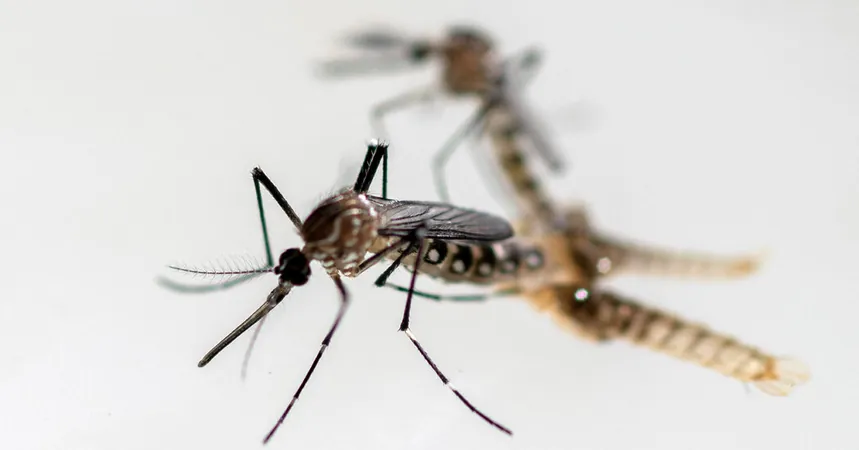
Shocking Death from Rare Mosquito-Borne Virus in New York Sparks Public Health Warning
2024-09-24
Introduction
In a chilling turn of events, New York has confirmed its first human case of Eastern equine encephalitis (E.E.E.) in nearly a decade, resulting in a tragic death that has set off alarms at the state level. Governor Kathy Hochul declared the mosquito-borne illness an imminent public health threat following the announcement of the fatality in Ulster County.
Details of the Case
The victim, a resident diagnosed on September 20, becomes part of a wider national concern as this marks the second death linked to E.E.E. in the United States this year. The first was reported in New Hampshire, involving a 41-year-old man who passed away in August. States such as Massachusetts, New Jersey, Rhode Island, Vermont, and Wisconsin are also grappling with the virus, according to the Centers for Disease Control and Prevention (CDC).
Lack of Details and CDC Reporting
Despite the lack of details on the deceased individual, the implications are stark. As of September 17, before New York’s case was confirmed, the CDC had already reported ten human cases of E.E.E. across the nation. The last human infection reported in New York prior to this incident was in 2015.
State Response and Preventive Measures
To combat the spread of E.E.E., Governor Hochul announced a series of preventive measures. These include providing mosquito repellent at state park facilities, raising awareness through signage in parks and historic sites, and consulting with local health departments to adjust park hours during peak mosquito activity times. The Department of Environmental Conservation is also getting involved, posting alerts and educational materials on social media to inform the public about the dangers and prevention of mosquito bites.
Health Commissioner’s Warning
Dr. James McDonald, New York's health commissioner, cautioned that E.E.E. is more widespread this year than usual. Typically found in just two to three counties each summer, mosquitoes infected with E.E.E. have now been identified in 15 counties, including Suffolk County on Long Island. He emphasized the need for New Yorkers to take action against mosquito bites, recommending the use of insect repellents and the elimination of standing water around homes to help curb the growing threat.
Concerns About Continued Mosquito Activity
With warmer weather continuing through mid-October, there's concern that these dangerous mosquitoes will remain active longer than previously anticipated. Health officials have raised alarms because there is no vaccine or cure for E.E.E.; while some individuals may show no symptoms, others could experience severe effects such as seizures, coma, or even death. Alarmingly, around one third of reported cases are fatal, and over half could lead to long-term neurological issues.
Historical Context
Eastern equine encephalitis is endemic to North America, with outbreaks recorded over the decades. In 2019, the U.S. witnessed 38 reported cases and 12 fatalities, marking the most significant outbreak seen in over 50 years. While New York remained untouched during that outbreak, history reveals that the state has seen seven deaths from E.E.E. since 1971; in 2015, two of three cases were fatal.
Transmission and Risk Factors
The virus primarily spreads through infected mosquito bites, leaving people susceptible regardless of their age, though those under 15 and over 50 are at heightened risk. Furthermore, E.E.E. poses a dire threat not just to humans but also to horses, with fatality rates soaring as high as 90%. In August, multiple horses in New York were confirmed infected, and sadly, two fatalities were reported.
Impact on Other Animals
Actors beyond just horses are also impacted: two emus fell victim to E.E.E. in Rensselaer County this month.
Other Mosquito-Borne Illnesses
Eastern equine encephalitis is just one of various mosquito-borne illnesses that the U.S. is facing this year, with the CDC noting that as of mid-September, 659 cases of the far more common West Nile virus had been reported nationwide.
Conclusion
This alarming situation calls for immediate attention from residents to protect themselves from mosquito bites as we await colder weather which could significantly reduce mosquito populations. New Yorkers are urged to stay informed and vigilant about this growing public health threat.


 Brasil (PT)
Brasil (PT)
 Canada (EN)
Canada (EN)
 Chile (ES)
Chile (ES)
 España (ES)
España (ES)
 France (FR)
France (FR)
 Hong Kong (EN)
Hong Kong (EN)
 Italia (IT)
Italia (IT)
 日本 (JA)
日本 (JA)
 Magyarország (HU)
Magyarország (HU)
 Norge (NO)
Norge (NO)
 Polska (PL)
Polska (PL)
 Schweiz (DE)
Schweiz (DE)
 Singapore (EN)
Singapore (EN)
 Sverige (SV)
Sverige (SV)
 Suomi (FI)
Suomi (FI)
 Türkiye (TR)
Türkiye (TR)